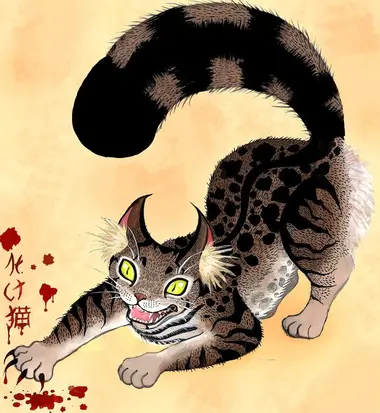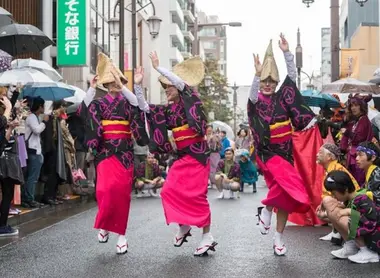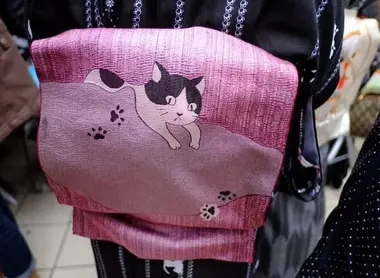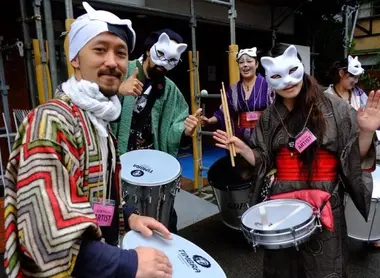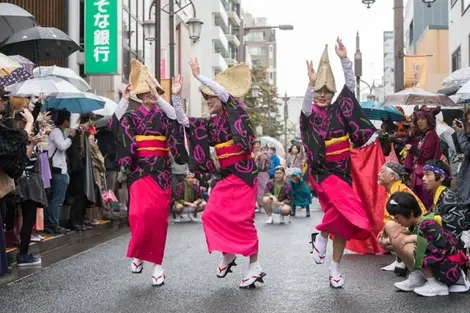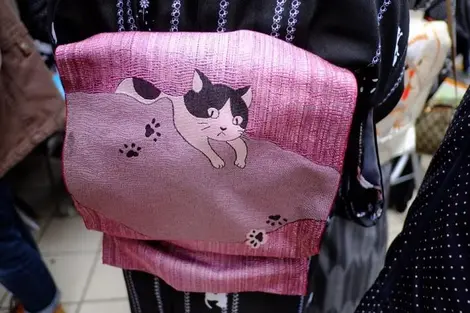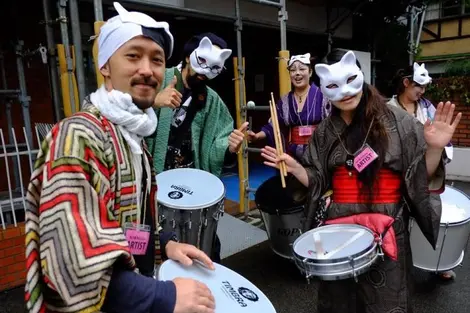Bakeneko or the legend of the cat-monster
- Published on : 02/06/2024
- by : Ph.L
- Youtube
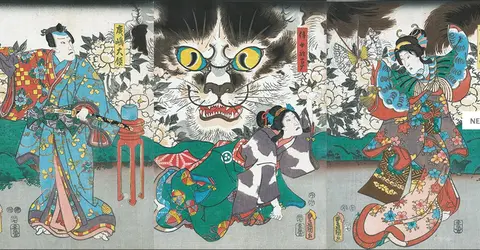
The Bakeneko, an unusual cat
Fudo Myo.com
In Japan's rich folklore, the bakeneko, or "monster cat", occupies a special place. This supernatural creature has fascinated and frightened for centuries. Combining mystery, superstition and magical powers, the bakeneko embodies the duality of the cat, both familiar and elusive. From the streets of Edo to the modern festivals of Tokyo, this legend continues to permeate Japanese culture. Let's discover the origins, characteristics and influence of this fantastic feline in the Japanese imagination.
Origins and characteristics of the bakeneko
The bakeneko, or 化け猫 in Japanese, is a yōkai (folk spirit) taking on the appearance of a cat with supernatural powers. Its origins date back to the Edo period (1603-1868), a period marked by the development of Japan's textile and sericulture industries. Cats, then used en masse to protect silkworms from rodents, proliferated in the streets, giving rise to numerous legends.
To become a bakeneko, a cat must meet certain criteria: be at least 13 years old, weigh more than 3.5 kg, or have an abnormally long tail. This last characteristic is at the origin of a widespread practice in the 17th century: cutting off the tails of kittens to prevent their transformation into yōkai. The bakeneko is often confused with the nekomata, another feline yōkai whose tail splits in two.
Physically, the bakeneko can resemble an ordinary cat, which makes it all the more disturbing. It can stand up on its hind legs and take on human form, usually that of its former master. This ability to metamorphose is one of the bakeneko's most emblematic traits.
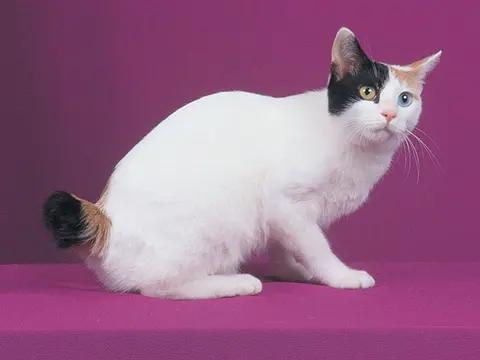
Japanese bobtail, short-tailed cat
The supernatural powers of bakeneko
The abilities attributed to the bakeneko are as varied as they are impressive. Among its most fearsome powers are the ability to speak human language, to metamorphose, and even to raise the dead. This last power has given rise to the superstition that a cat should never be allowed near a corpse.
The bakeneko is also reputed to be able to project fireballs, manipulate the dead and possess humans. In some stories, it can create illusions and control time. One particularly frightening legend has it that the bakeneko may even devour its master to take his place and control the entire household.
A curious trait of the bakeneko is its taste for lamp oil. This characteristic, though less supernatural, contributed to the mistrust of cats, as lamp oil was often made from fish fat in those days.
The different types of monstrous cats in Japanese folklore
The bakeneko is not the only supernatural cat in Japanese folklore. The nekomata, often confused with the bakeneko, is a cat whose tail has split in two. It is generally considered more powerful and malevolent than the bakeneko. According to legend, nekomata live in the mountains and can grow to the size of a lion or leopard.
In contrast to these evil creatures is the maneki-neko, the famous "cat that brings good luck". This lucky cat, often depicted with one paw raised, is considered a benevolent spirit. It is frequently found at the entrance to shops to attract prosperity.
There are also regional variations of supernatural cats. In certain regions of Japan, for example, cats are said to be able to control the weather or summon storms. These different incarnations demonstrate the richness and diversity of Japanese cat folklore.
Famous bakeneko legends
Several famous legends feature the bakeneko. One of the most famous is that of Takasu Genbei, whose mother's behavior changed abruptly after the disappearance of her cat. One day, Takasu spotted a monstrous cat-like figure in his mother's bedroom, wearing his mother's clothes and devouring a carcass. Frightened, he killed the creature, which then took on the appearance of the missing cat.
Another legend tells the story of O Toyo, favorite of Prince Nabeshima, who was actually replaced by a bakeneko. The cat-vampire took on the appearance of the young woman to feed on the prince's blood every night, making him seriously ill. It was only thanks to the vigilance of a guard that the deception was discovered and the bakeneko defeated.
These stories, passed down orally and then recorded in collections such as the "Yamato Kaiiki" (Mysterious Stories of Japan), have helped to firmly anchor the figure of the bakeneko in the Japanese imagination.
The influence of bakeneko in Japanese popular culture
The bakeneko has left a lasting imprint on Japanese popular culture, influencing literature, cinema, manga and video games. References to bakeneko can be found in many contemporary works.
In animation, the famous Studio Ghibli paid tribute to bakeneko with the character of the Cat-Bus in the film "My Neighbor Totoro". This character, both cat and vehicle, perfectly embodies the fantastic spirit of bakeneko.
Manga and anime also make frequent reference to this creature. In "Soul Eater", for example, the character of Blair is a cat-witch with powers similar to those of the bakeneko. In "One Punch Man", the character Meow is directly inspired by the legends of the bakeneko.
The influence of the bakeneko also extends to video games. In the "Pokémon" series, creatures such as Mentali are inspired by the legends of supernatural cats. Similarly, in "Final Fantasy", feline characters with magical powers are reminiscent of bakeneko.
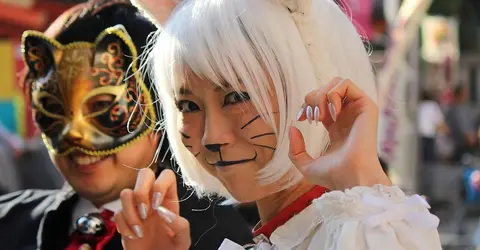
A parade from Bakeneko to Kagurazaka
Flick/ L.S.P tokyo
Bakeneko Matsuri: a festival in honor of the monster cat
Despite its frightening nature, the bakeneko is now celebrated at an annual festival in Tokyo. The Bakeneko Matsuri, held since 2010 in the Kagurazaka district, is a veritable ode to the cat-monster. Held every year in mid-October, the festival coincides with Halloween, adding an extra dimension to the fantastic atmosphere of the event.
The highlight of the festival is a grand parade where participants parade around dressed as cats. Costumes range from simple feline accessories to elaborate representations of bakeneko and other supernatural cats. The parade is followed by the "Anya Odori", or "Nya dance", where local residents, dressed as cats, dance to the sound of costumed musicians.
The festival also features a wide range of cat-themed activities: feline-themed food and drink stalls, face-painting workshops, cat-patterned kimono rentals. It's a chance for visitors to immerse themselves in the fantastic world of bakeneko and celebrate this emblematic figure of Japanese folklore.
For lovers of Japanese culture and cat enthusiasts alike, the Bakeneko Matsuri is an event not to be missed. It offers a unique experience, blending folk tradition with modern festivities. Visitors can even enjoy discounts in some local stores if they wear a bell, just like the ones cats wear on their collars.
Whether you're interested in celebrating Halloween in Tokyo as an adult, or you'd like to celebrate Halloween in Tokyo with children, the Bakeneko Matsuri offers a unique experience that will delight young and old alike.
